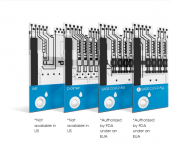Arthur Hanson
Well-known member
The ability of semis of all types from sensors to communications to processes is what is driving the semi sector. We are about to see an "Automation of Everything" revolution if special interests of all types can be worked around. Doctors spend forty percent of their time on diagnostics and in no way can a human even come close to a platform in this area in speed and accuracy and also be kept up to date in real time. Much of the diagnostics have the ability to be automated and special interests that drive high medical costs driven by special interests are standing in the way. This is now true of many professions and represents an area of staggering gains in speed, accuracy, and lowering cost. The ability to automate almost everything and integrate active data bases will represent a true revolution in how things are executed. The ability to combine massive databases with low cost per unit memory and unparalleled computational powers at ever lower costs will only be prevented by special interests. This will apply to medicine, law, engineering, and just about everything we engage in. Low-cost memory, processing, sensors, and communications together have brought us to the tipping point of a true revolution in the history of mankind. I only hope we have the wisdom and fortitude to override the special interests to make this happen. Any thoughts or comments appreciated. The tipping point is here and now.

